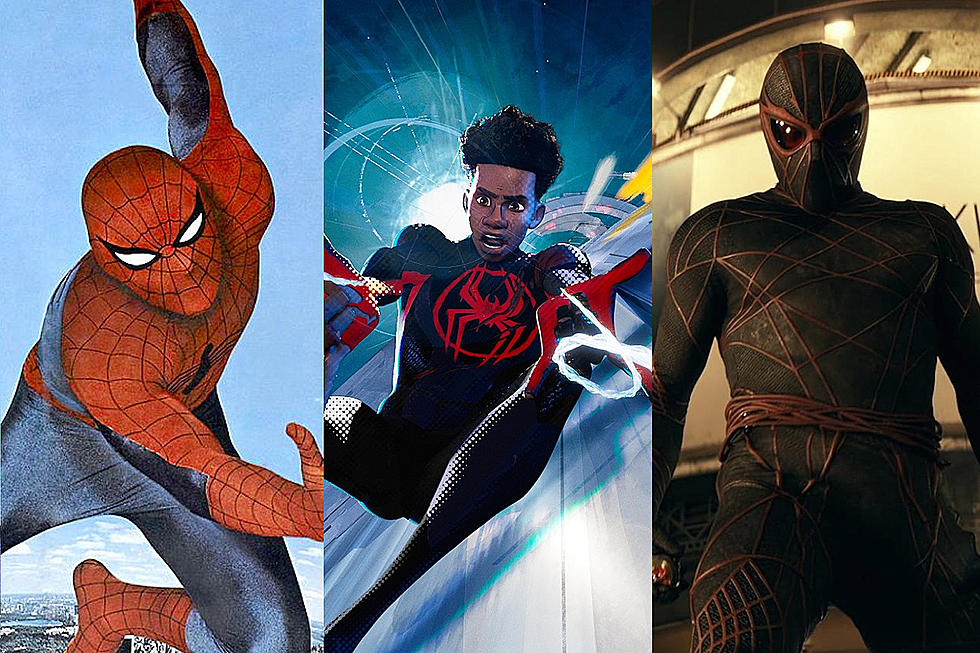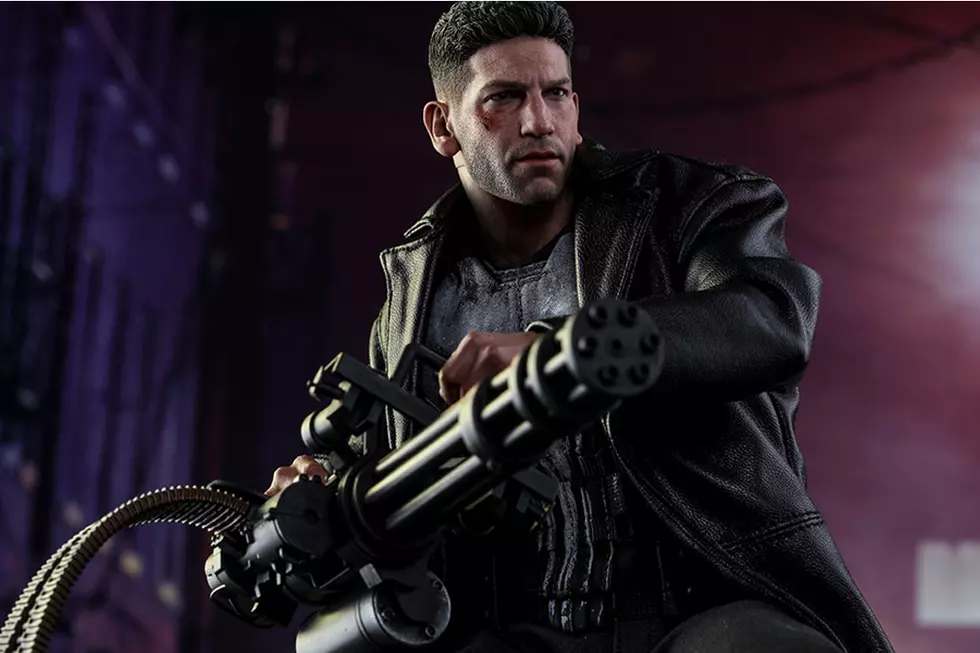![‘The Punisher’ #1: Frankie Goes To Hollywood [Review]](http://townsquare.media/site/622/files/2014/02/Pun11.jpg?w=980&q=75)
‘The Punisher’ #1: Frankie Goes To Hollywood [Review]
Shortly after Greg Rucka was informed that he would no longer be continuing his absorbing run on The Punisher, he gave a scathing interview to Mark Millar's CLiNT magazine, in which he lamented the "Hollywoodization of the two main companies." In the case of Marvel's number one sociopath, that statement might turn out to be eerily accurate. The All-New Marvel NOW Punisher series from writer Nathan Edmondson and artist Mitch Gerads relocates Frank Castle from the grimy streets and cluttered skylines of New York City to balmy, colon-cleansed Los Angeles. Does the setting make for an interesting new beginning for the Punisher, or is it bad location scouting?
The problem with the Punisher is that there's really only one way to do the character right. Relaunch the Punisher as a crime boss or an avenging angel and you're completely missing the core of the character. Kill him and resurrect him as a monster and you may end up with a fun story, but it doesn't feel like a Punisher story at all, and he could easily be replaced by any other character without really changing the story. The best Punisher stories are built on a very simple formula, and the best writers have all put their spin on what was essentially the same approach. Steven Grant, Mike Baron*, Garth Ennis, Jason Aaron, and Greg Rucka all basically hit the same note with the way they handled Frank Castle, but (not to get too jazzy on you) it was the way they played the note that made their runs memorable.
(*Uh, Baron hit that note pretty well for a while, but somewhere along the way he broke a string. Early-to-mid Baron Punisher is great, late Baron Punisher is prone to massive missteps like making Castle a black man and partnering him with Luke Cage. To be fair, this arc was co-written by Marcus McLaurin, but still. Ech.)
In All-New Marvel NOW The Punisher #1 (I think we're required to say All-New Marvel NOW at least three times), Edmondson and Gerads are taking the right approach. The core of the character remains the same, and nothing about the Punisher has been revamped, just relocated. It's not an Earth-shattering idea: the Punisher travels all around the world in search of skulls to stomp, and if memory serves, he's been to Los Angeles before. But it's implied that this is a permanent change, that for the time being, Castle has set up shop in la-la-land, where there's a different class of criminal, and unlike New York, the skies aren't congested with superheroes. It's not a monumental change, but it is different, and it gives us the opportunity to get high and pretend that this whole L.A. thing is just a meta-commentary on DC's decision to move to California.
Visually, the new setting works like gangbusters. Gerads goes nuts on L.A.: from smog-hazed cityscapes to the desolate beauty of Yucca Valley, he nails the look and color of the environment, and drafts a Frank Castle that recalls classic versions by Mike Zeck, John Romita Jr., and Goran Parlov while being something entirely new. He's gruff and grizzled again, and looks every bit as iron-wrought and old-man strong as he should, not like the sleek young versions of Marco Checchetto and Giuseppe Camuncoli. This Punisher looks like he just stepped out of a Cormac McCarthy novel to throttle us to death, with creases in his face like fissures in the desert. Gerads is a strong artist with a classic style and a strong sense for page layouts. He's a perfect fit for the book.
As far as the plot of the first issue, it's solid, but there's not much to be surprised by. While the Punisher deals with a Los Angeles cartel known as Dos Sols (Two Suns?), an elite paramilitary group prepares to put Castle down once and for all. (Thus the "Hunted" teaser images.) It's been done before, and it's even been perfected before, in Ennis and Parlov's immaculate "Valley Forge, Valley Forge" arc. Maybe it will unfold into something different, but as of right now, it's not that original an idea.
I'm okay with all of that. I'm okay with the relocation not being a monumental shakeup, and I'm okay with Punisher being stalked by another Special Ops squad, even though that's been done before. Like I said, the problem with the Punisher is that there's really only one way to do him right; there's little room for reinvention. And although nothing about the new status quo is revolutionary or anything, it's still a new twist on a classic Punisher setup, and one that opens up loads of new story possibilities.
Frank is more enjoyable, more talkative than he's been in recent years; at one point he even smiles, making you think this might be a softer, gentler Punisher, which sounds about as awesome as a wet sweater. But he still does crazy, unpredictable stuff, like blowing up a building with a rocket launcher rather than going inside for a shootout, or blowing a man's hand to bits because he touched his gun. That stuff is classic Punisher, and Edmondson understands the the fun of the Punisher (even in Ennis's Punisher MAX) are the actions that seem crazy to us, and completely logical to him.
But there are problems that prevent the book from achieving missile lock. It's trying too hard to be clever, the type of clever that doesn't work with this character. The dialogue reaches for Azzarrello-like wordplay and falls short (which even Azzarrello often does), ending up bland and typical. You can see what Edmondson is going for, but in this first issue, he doesn't quite get it. Maybe it's just because the last three great Punisher writers were also three of the very best writers of dialogue in comics -- Garth Ennis, Jason Aaron, and Greg Rucka -- and comparing a relative newcomer to them might be unfair. But as recent and memorable as those runs were, that type of comparison is inevitable.
Speaking of inevitability... Even in the structure, it seems too much effort is put into cleverness, to set up metaphors and callbacks. For instance: after shooting that scumbag's hand to pieces, Frank takes the guy's skull ring as a souvenir. If we aren't able to see the significance immediately, one page later, we see the title of the issue is "Memento Mori" so it's pretty much spelled out. The ring is a reminder of the inevitability of death, much like the skull on Punisher's shirt. It's a decent idea, it hits on the existential themes that Steven Grant highlighted in his work, and it fits with the character. Got it.
But in a very clunky moment, one character comes right out and explains to Frank that the skull ring is actually a memento mori, a reminder of the inevitability of death, and Frank says something about not needing a reminder that death is coming for him, and then the book does a fade transition with the ring and L.A. that just feels like too much, and within the span of a couple of pages, you're shaking your head thinking "I get it, I get it." If that's not enough, at the very end of the issue (trust me, it's not a spoiler), in yet another instance of generic dialogue, one character comes right out and says Castle's death is inevitable. It's too much.
It seems that Edmondson is putting this stuff there for the reader's benefit, but the reader really doesn't need it. We get what Edmondson is going for, but we got it the first time, and it doesn't need to be repeated over and over. A) Everybody knows that skulls are reminders of death. They're skulls. Skull rings and t-shirts and tattoos and metal album covers and blacklight posters rawk your mom's dick off because they remind us of death. B) The title of the issue is "Memento Mori," and even if someone doesn't know what it means, and doesn't innately know -- as all humans do -- that skulls are reminders of the inevitability of death, all they've got to do is Google it. What could have been a nice metaphor becomes heavy-handed pretty quickly, and it's telling us something we already know anyway: death is inevitable, Castle is inevitable, Castle is death. I don't blame The Punisher for reminding us of that, but there are more artful ways to do it.
This new beginning for The Punisher isn't necessarily a bad one, but it has some obvious flaws. Everything is in place to make it a good story: great art, interesting setting, a solid understanding of what makes Frank Castle work, and a proclivity for the type of unpredictable mayhem that makes a psychopath fun. If it improves in a couple of areas, the All-New Punisher may become a memorable new chapter in Frank's story. If it doesn't, it won't be too long before we're cursing Marvel once again for benching Greg Rucka in the middle of a great run. Personally, I'm rooting for this new Punisher, and willing to give it the chance to get better. If it doesn't, yet another relaunch may be...oh, what's the word. It means the same thing as unavoidable, but it sounds smarter. Screw it, let's just go with unavoidable.
More From ComicsAlliance






![Rogues’ Gallery: Who Is The Punisher’s Ultimate Enemy? [Poll]](http://townsquare.media/site/622/files/2017/01/Punisher-Vote.jpg?w=980&q=75)


